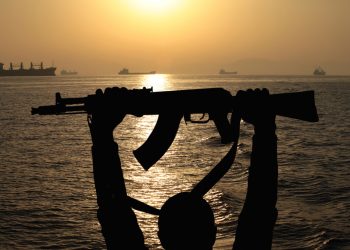Companies to meet their humanitarian obligations toward their crew
 There is no getting away from the fact that shipowners will find a way to get ships released.
There is no getting away from the fact that shipowners will find a way to get ships released.
Shipowners will continue to pay ransoms despite the sentencing of six security personnel arrested at Mogadishu airport while delivering money but now the UK Foreign Office has opened its own investigation into piracy and ransoms.
The six men, including three UK citizens hired by security company Salama Fikira, were handling 2.2m ($3.6m) intended to secure the release of the 17,300-dwt Suez (built 1984) and 22,350-dwt Yuan Xiang (built 1978). They received sentences of between 10 and 15 years.
The International Chamber of Shipping (ICS) director of external affairs Simon Bennett says he believes shipowners will not be discouraged and will still find a way to make the payments. “It will not alter the determination of shipping companies to meet their humanitarian obligations toward their crew,” he added.
Security companies say there are many alternatives available to owners including tried and tested methods of dropping ransoms on beaches and directly onto ships from the air.
Ince & Co partner Stephen Askins adds that ransom payments are still being made. “Ransoms have been paid since the arrest. Delivery companies will find a route and there are always alternatives depending on the circumstances. Inevitably this is a business and there needs to be some flexibility,” he said.
One potential problem, he suggests, will be the effect of the loss in transit insurance covering the ransom payments. While premiums are sure to increase, more security will also be required to protect the payments.
There is also some confusion in the industry about the stance of the Somalian government toward ransom payments after what turns out to be a sudden turnaround.
Earlier this year, the Transitional Federal Government is thought to have played a significant role in securing the release of two elderly UK citizens. Yet within a few months it seems to have had a change of heart, demonstrated by the arrest and conviction of those attempting to secure the release of hijacked ships and seafarers.
The UK government is also reviewing its policy toward the payment of ransoms. Although in principle it is against them, under UK law they are legal, provided the proceeds do not end up in the hands of terrorists.
The Foreign Affairs Committee this week opened a hearing into piracy that is expected to review the issue. Giving evidence were Andrew Voke, chairman of the Lloyd’s Market Association (LMA) Marine Committee, Ince & Co’s Stephen Askins, ICS director Mark Brownrigg and EU Navfor operation commander Major General Buster Howes.
Highlighting the human cost of piracy, Save Our Seafarers this week released a statement saying 62 seafarers’ lives have been claimed in bandit actions off Somalia over the past four years and 3,500 seafarers held hostage.
Deaths were caused by murder, malnutrition, suicide, drowning and disease. Dipendra Rathore, a 22-year-old deck cadet who survived the ordeal of being held hostage for eight months, said: “At my age, you can still bear pain but watching people twice my age being tortured, crying and begging for help is what really measured me. I felt so bad for them but I could do nothing about it, except for praying, and then came the time when I lost faith and stopped praying too.”
Source: ICS
































































